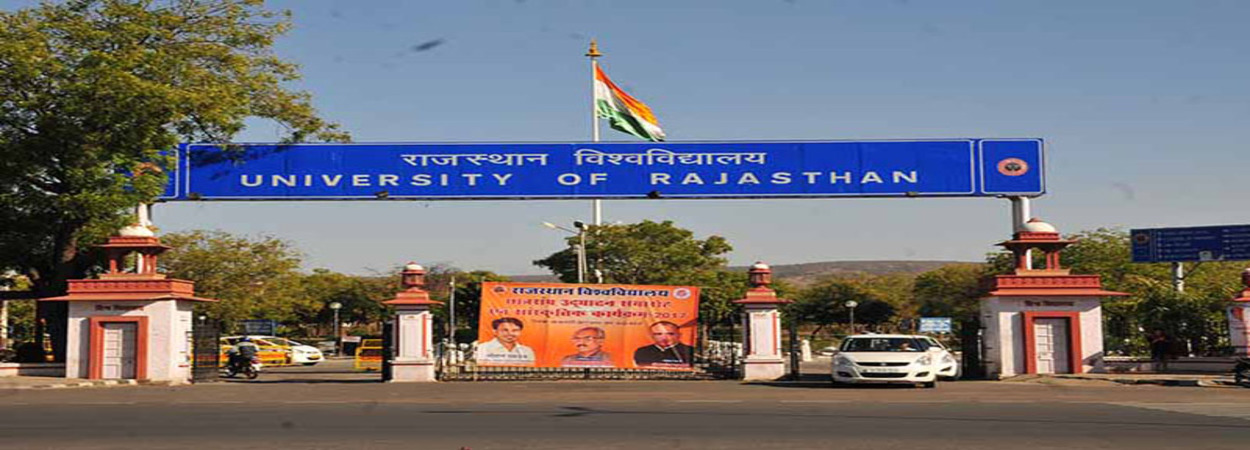Introduction about Ph.D. From Rabindranath Tagore University
Rabindranath Tagore University, located in Assam, is a prestigious institution known for its commitment to academic excellence, cultural heritage, and innovative research. The Ph.D. program at this esteemed university is designed to cultivate high-level research skills and critical thinking among scholars from various disciplines. With a legacy inspired by the visionary poet and Nobel laureate Rabindranath Tagore, the university blends a rich cultural ethos with modern academic rigor, providing an environment that nurtures creativity and intellectual growth.
The doctoral program is meticulously structured to ensure that students receive comprehensive training in research methodologies, advanced theories, and practical applications. Through a balanced mix of coursework, research projects, seminars, and interactive workshops, candidates are encouraged to develop original research ideas and contribute significantly to their fields of study. Faculty members, who are experts in their domains, mentor students at every step, ensuring that their research meets international standards. In addition, state-of-the-art research facilities, extensive digital libraries, and collaborative platforms support the academic journey, making Rabindranath Tagore University an ideal destination for those who aspire to lead in research and academia.
The Ph.D. program not only focuses on academic and research excellence but also emphasizes ethical research practices and interdisciplinary learning. This holistic approach equips graduates with the skills and knowledge required to address complex global challenges. Whether your interest lies in the sciences, humanities, or social sciences, the program offers a robust framework that encourages innovation, critical analysis, and creative problem-solving. Ultimately, the Ph.D. experience at Rabindranath Tagore University prepares scholars to become influential leaders in academia, industry, and beyond.
Fee Structure for Ph.D. in Rabindranath Tagore University
The fee structure for the Ph.D. program at Rabindranath Tagore University is designed to be affordable while ensuring high-quality education and research support. Below is a breakdown of the typical fee components:
| Tution Fee Per Year | Registration | Total Fee |
|---|---|---|
| Rs. 70,000 | Rs. 15,000 | Rs. 85,000 |
Admission Process For Ph.D. in Rabindranath Tagore University
The admission process at Rabindranath Tagore University is designed to select the best candidates through a rigorous and transparent evaluation. The process ensures that prospective candidates have a strong academic background and research aptitude. Below are the key steps:
- Review the eligibility criteria and guidelines on the official university website.
- Complete the online application form with accurate personal, academic, and research information.
- Submit the required documents including academic transcripts, research proposal, and identity proofs.
- Appear for a written entrance examination that tests your research aptitude and subject knowledge.
- Attend a personal interview with the selection panel from the respective department.
- Receive the final admission decision based on your overall performance.
It is essential to follow the deadlines and ensure that all the documents are complete and accurately submitted to streamline the admission process.
Ph.D. Subjects in Rabindranath Tagore University
The Ph.D. program at Rabindranath Tagore University offers a diverse range of subjects to cater to the interdisciplinary interests of its scholars. The curriculum is structured to provide both depth and breadth in academic research. Below is a sample list of core subjects offered:
| Subject | Description |
|---|---|
| Advanced Research Methodology | Covers innovative research techniques, data analysis, and experimental design. |
| Interdisciplinary Studies | Encourages collaboration between different fields to solve complex research problems. |
| Quantitative & Qualitative Analysis | Provides training in statistical methods and qualitative research approaches. |
| Special Topics in [Your Discipline] | Offers customized content based on emerging trends and specific research interests. |
Document Required For Ph.D. in Rabindranath Tagore University
To ensure a comprehensive evaluation, Rabindranath Tagore University requires applicants to submit a set of essential documents that validate their academic credentials and research potential. The required documents include:
- Academic Transcripts and Degree Certificates from all previous institutions.
- A detailed Research Proposal outlining your proposed area of study.
- A comprehensive Curriculum Vitae (CV) highlighting academic and professional achievements.
- Proof of Identity such as Aadhaar card, Passport, or any government-issued ID.
- Letters of Recommendation from academic mentors or industry professionals.
- A Statement of Purpose (SOP) that explains your research interests and career objectives.
Ensure that all documents are current, verified, and submitted in the prescribed format to facilitate a smooth application process.
Rabindranath Tagore University Ph.D. Syllabus
The syllabus for the Ph.D. program at Rabindranath Tagore University is designed to offer a comprehensive learning experience that combines rigorous coursework with extensive research training. The curriculum is divided into several phases to ensure a progressive and in-depth study. Below is a sample breakdown of the syllabus:
| Phase/Semester | Subject/Module | Credits/Weightage |
|---|---|---|
| Phase I | Core Research Methodology and Foundation Courses | 20 |
| Phase II | Advanced Theories and Specialized Electives | 15 |
| Phase III | Interdisciplinary Research and Data Analysis | 25 |
| Phase IV | Thesis Writing, Defense, and Publication | 40 |
The syllabus is periodically updated to incorporate the latest research trends and technological advancements, ensuring that students receive a contemporary and comprehensive education.
Rabindranath Tagore University Research Methodology
The research methodology training at Rabindranath Tagore University is a vital component of the Ph.D. program, equipping candidates with the necessary skills to conduct rigorous and impactful research. Key aspects of the methodology training include:
- Development of a robust research framework and detailed proposal formulation.
- Training in both qualitative and quantitative research techniques.
- Workshops on advanced data analysis methods and statistical tools.
- Emphasis on research ethics, data integrity, and best practices.
- Regular mentoring sessions and peer reviews to refine research strategies.
Rabindranath Tagore University Highlights
Rabindranath Tagore University is renowned for its rich cultural heritage, academic excellence, and state-of-the-art research facilities. The following table highlights some of the key aspects that make the university a distinguished institution:
| Aspect | Details |
|---|---|
| Established | A visionary institution inspired by Rabindranath Tagore's legacy |
| Location | Assam, India – A region known for its natural beauty and cultural diversity |
| Accreditation | Nationally and internationally recognized for academic excellence |
| Facilities | Modern research labs, digital libraries, and collaborative research centers |
| Faculty | Distinguished academicians and research experts with global experience |
| Collaborations | Partnerships with leading academic institutions and research organizations |
| Student Support | Scholarships, mentorship programs, and comprehensive career counseling |
How To Apply For Ph.D. in Rabindranath Tagore University
Applying for the Ph.D. program at Rabindranath Tagore University is a streamlined process designed to facilitate a smooth transition into doctoral studies. Follow these steps to complete your application:
- Visit the official Rabindranath Tagore University website and navigate to the Ph.D. admissions section.
- Review the eligibility criteria and detailed admission guidelines provided.
- Fill out the online application form with accurate personal, academic, and research details.
- Upload all required documents including academic transcripts, research proposal, CV, and identity proof.
- Pay the application fee as per the instructions on the portal.
- Submit your application before the specified deadline and retain a copy for your records.
- Prepare for the entrance examination and personal interview conducted by the selection panel.
- Regularly check your email and the application portal for updates regarding your admission status.
Courses After Ph.D. in Rabindranath Tagore University
After successfully completing the Ph.D. program at Rabindranath Tagore University, graduates have the opportunity to further enhance their academic credentials through various advanced courses and professional development programs. These additional courses are designed to provide specialized knowledge and prepare candidates for leadership roles in academia and industry.
- Post-Doctoral Research Programs
- Advanced Certificate Courses in Emerging Research Areas
- Executive Leadership and Academic Management Training
- Specialized Workshops and Seminars for Skill Enhancement
- Industry-Academia Collaborative Programs and International Exchange Opportunities
Rabindranath Tagore University Scholarship
Rabindranath Tagore University is dedicated to supporting its doctoral candidates through a comprehensive scholarship program. These scholarships are designed to provide financial assistance covering tuition fees, research expenses, and sometimes even a living stipend, allowing students to fully concentrate on their academic pursuits. Awarded on the basis of academic merit, research potential, and financial need, the scholarship program plays a crucial role in fostering a culture of research excellence and innovation. Detailed eligibility criteria, application procedures, and deadlines are provided on the official university website. By offering robust financial support, Rabindranath Tagore University ensures that its Ph.D. scholars have the necessary resources to undertake high-quality research and make significant contributions in their fields.
- Merit-based scholarships for outstanding academic achievements.
- Need-based financial aid to support tuition and research expenses.
- Research grants for conference participation, publication fees, and project funding.
- Opportunities for international collaborations and academic exchange programs.
- Dedicated mentorship and career development support as part of the scholarship package.
Rabindranath Tagore University FAQ's Regarding Ph.D.
Below are some frequently asked questions that provide clarity on various aspects of the Ph.D. program at Rabindranath Tagore University:
- What are the eligibility criteria for the Ph.D. program?
Candidates must hold a relevant Master’s degree with a strong academic record and meet the minimum research experience requirements specified by the university.
- How can I apply for the Ph.D. program?
Applications are submitted online through the official Rabindranath Tagore University website by completing the application form and uploading the required documents.
- What does the fee structure include?
The fee structure comprises the annual tuition fee, registration fee, and the total fee, as detailed in the fee structure table above.
- Are there scholarships available for Ph.D. candidates?
Yes, the university offers scholarships based on academic merit and financial need. More details can be found in the scholarship section on the website.
- What subjects are included in the Ph.D. curriculum?
The curriculum includes core subjects such as Advanced Research Methodology, Interdisciplinary Studies, Quantitative & Qualitative Analysis, and specialized topics tailored to your research interests.
- Which documents are required for the application?
Applicants must submit academic transcripts, a detailed research proposal, a comprehensive CV, identity proofs, letters of recommendation, and a Statement of Purpose (SOP).
- What does the research methodology training involve?
The training covers both qualitative and quantitative research methods, advanced data analysis techniques, research ethics, and the development of a robust research framework.
- How long does the Ph.D. program take to complete?
The duration typically ranges from three to five years, depending on the research area and progress of the candidate.
- Is there support for publishing research work?
Yes, students receive guidance from experienced faculty, access to research journals, and opportunities to present their work at national and international conferences.
- What career opportunities are available after completing the Ph.D.?
Graduates can pursue academic careers, post-doctoral research, industry roles, or advanced professional training programs.















